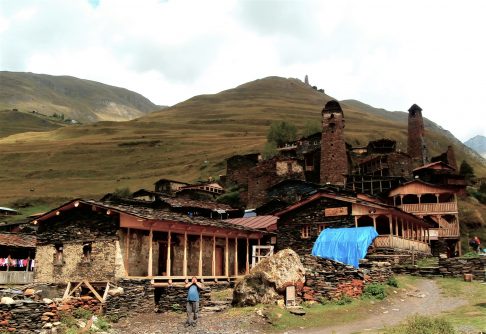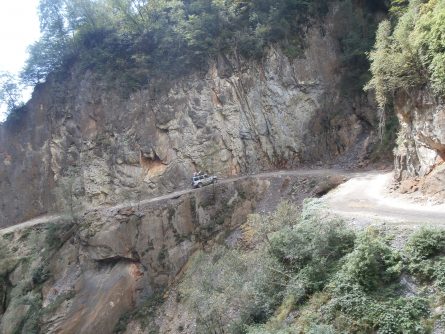Tusheti, Georgia – The Great Caucasus Mountains (Part 2)
Tusheti, in the Caucasus Mountains is a most remote part of Georgia

“Why is Max here?” asked Bishop David Makharadze on the night that we arrived; his questions became ever more pointed, and on the final morning, I heard his voice from behind ask my colleague John “what faith does Max believe in?”
Pondering this question over my morning boiled egg, I decided to take a defensive position. “Ten years at an Anglican boarding school knocked any sense of dogma and religion out of me.” “Ah, he said gently, the Anglicans lost their way.”
An hour and a half later, and by now sitting at his table, I realised that Bishop David was a truly remarkable man. His answers to my questions about the difference between the social binding of the Georgian and Armenian Orthodox churches (well, conversation was slacking, and I wanted to appear to be alert), were met with a unequivocal answer.
“The Armenians betrayed their people and their beliefs in the 5th century, so how would one ever trust such a church to hold fast the dogma of the church today?” Well, he had a point, I thought … and he continued, “The church in Georgia today has remained unwavering to the correct and original dogma of the church, it is trusted and it is alive”.
And he is not wrong.
It is, at first glance, difficult to understand how this tiny corner of the world has remained peaceful, intact and culturally strong. There are, of course, many isolated areas of the world that have not managed to do so; indeed, Georgia as a country has faced the last century as an occupied nation and then one in civil war, yet its character has remained defiant and strong.
The Tush survival has been a factor of many elements and among the strongest is the system of land ownership, and its social effect. Dating back to the dawn of time, Tush families own land and simply do not sell it. It gets passed down through generations completely undisturbed by outsiders arriving other than to marry into a family.
As a result, there are no businesses from outside; no developers able to buy land and start to chip away at the social and economic fabric. It is also a part of their heritage for those who have left to return at least once a year to the land, and this constant connection has maintained ties that elsewhere have been broken.
I am still unable to really process my impressions of Tusheti; I was only there, of course, for a brief time, and gained insight to only a flake of Tushetian life. I saw in that brief period, I think, a hint of what contentment can be. Happiness, once defined as “living in harmony with the order of things” is nowhere more apparent than here.
The respect for social order allows the communities to live harmoniously and the maintenance of ancient traditions, no more evident than in the superb horsemanship of the Tush people, maintain a link from the past to the future.
The roads, on the other hand, are a different matter. From our Near Feast experience in Girevi we crawled back over the ruts and through the grooves to our hotel, the wonderful Guesthouse Shina in Omalo; there, conversation, marvellous food, wine and the gentle rhythm of village life awaited.

Dinner, a traditional (and, it has to be said, plentiful) feast each night, washed down with some remarkable wines that our friend John brought from his winery, Pheasant’s Tears, in Sighanagi was a treat each night; and let me tell you that John knows a thing or two about wine making.
John specialises in “Natural Wines”. These are basically the juice from stomped grapes poured into a large underground clay pot (a “qvevri”) with some skins and wood, fermented for a couple of weeks and then transferred to another qvevri for a further four to six months.
This process is augmented by the use of a series of most eccentric and ancient wooden tools, the specific uses of I wouldn’t care to ponder. The resulting wines however are simply delicious; and the extraordinary variety of Georgian grapes – some 450 at least – spare the palate a continuation of the overdose of our common Chardonnays, Pinots and Merlots.
They are wonderful wines indeed, and washed down our dinners a treat.
The guesthouse is lovely; it offers accommodation to about twenty travellers in comfortable bedrooms, with a mildly eccentric electrical delivery system adding to the fun. The hosts are delightful, the hospitality unmatched and the views of both the distant mountains and the nearby forts are simply inspiring. It certainly epitomises the ideals of a guesthouse, and I can’t wait to return.
I didn’t actually know I was going to go to Tusheti until about three or four days before I arrived when I received and email from my friend and business colleague Ia. I was travelling to Georgia for a couple of day’s meetings with Ia and John to look at some projects that we are working on, and it was decided (by her or them, I am not quite sure), that Tusheti would be a good place to meet and ponder.
This pretty typical of Ia; apart from being the most dazzlingly beautiful woman in the Caucasus, she is an imaginative and very creative travel-type; her persistence in trying to sell Georgia to the outside world was both amusing and successful, and now she is a partner in a terrific local travel company with whom I love to work.

I had a hard timing processing Tusheti; the grandeur, the isolation, the strength of community, the air, the hospitality, the history and architecture, the horsemanship and the serenity. I still have a hard time, but know that I would like to return, and next time stay for longer, and spend more time in the smaller villages, and perhaps even ride a horse.
